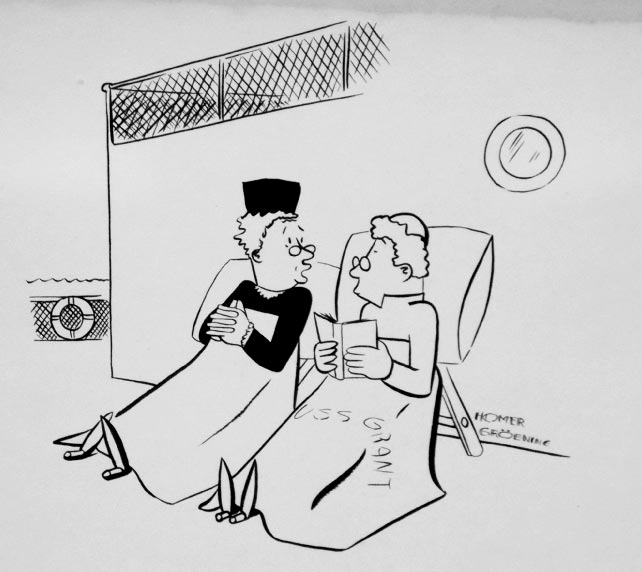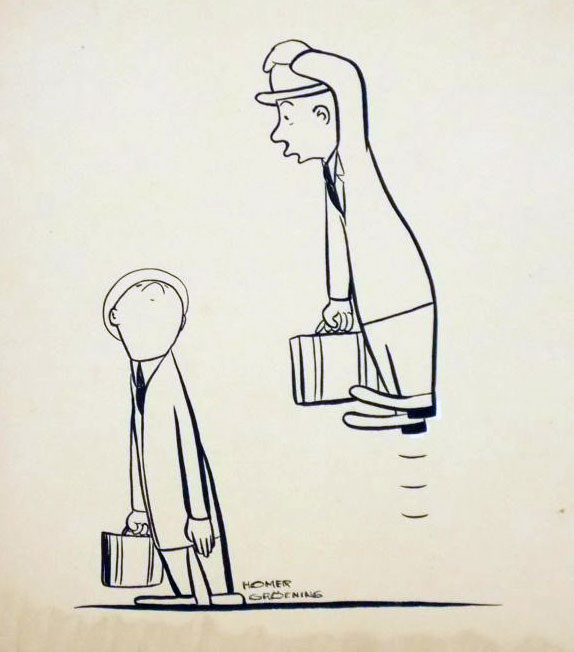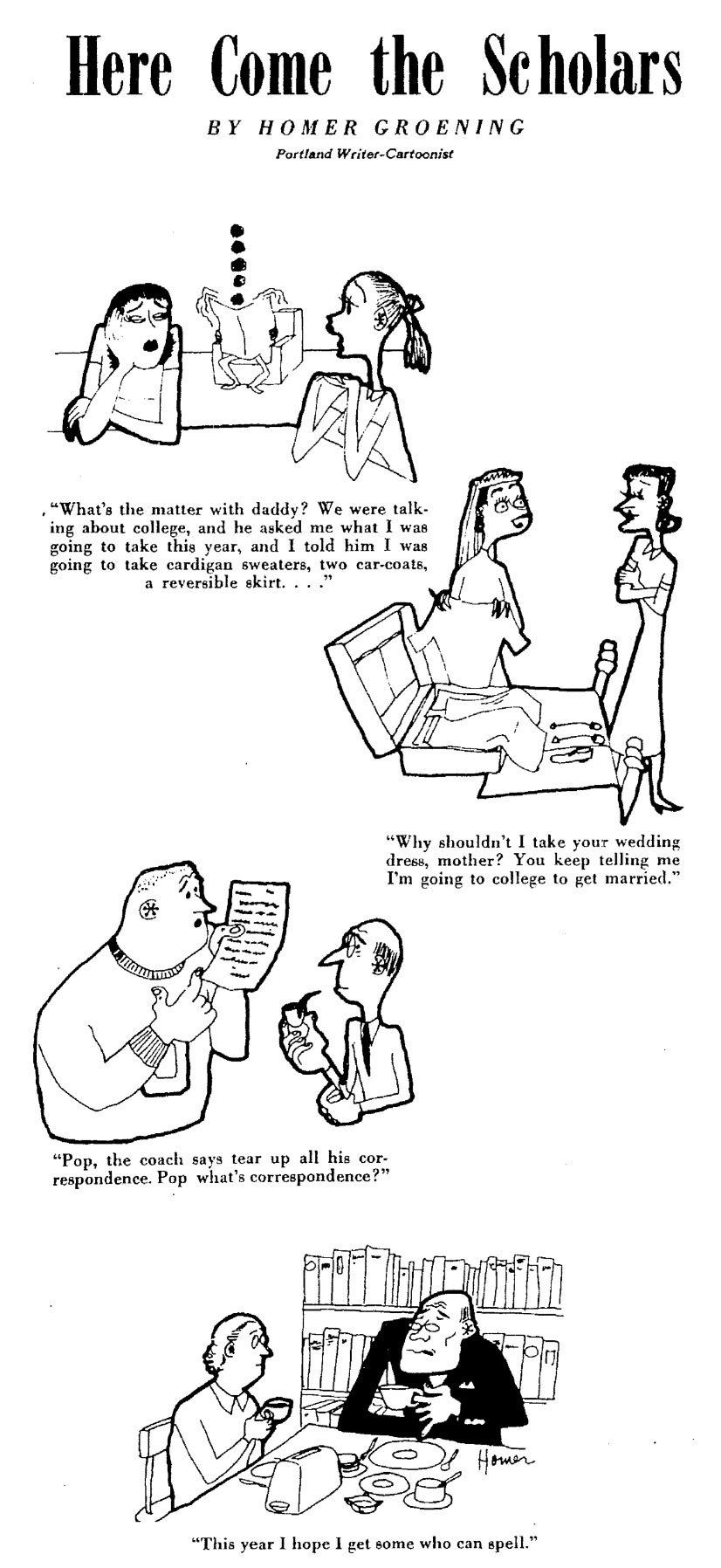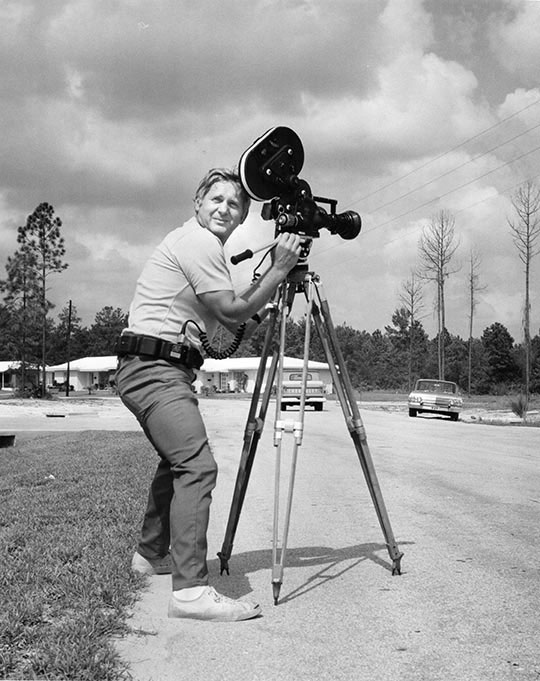Cartoons by Homer Groening for The Sunday Oregonian Magazine, published in the 1950s.
Homer Groening was a Canadian-American advertiser, film director, short story writer and cartoonist. He made various amateur movies and some cartoons in the 1940s, 1950s and 1960s, among them the comic strip 'Phoebe, Get Your Man' (co-created with Peg Bracken). While he showed talent and was syndicated at the time, Groening never experienced a major breakthrough. His career pales compared with the success of his more famous son, Matt Groening, best known as the creator of 'Life in Hell', 'The Simpsons', 'Futurama' and 'Disenchantment'.
Life and career
Homer Philip Groening was born in 1919 in Main Centre, Saskatchewan, Canada. His first name was a reference to the Ancient Greek poet Homer. His father, Abram Abraham Groening, was a teacher and later college professor of Ukrainian-German descent. As revealed in an article by Dale Suderman (Hillsboro Free Press, 16 August 2007), Abram Abraham Groening and his wife originally lived in Hillsboro, Kansas, but when in 1917 the USA got involved in the First World War, their neighborhood became more hostile. Since the Groenings spoke High German and Plautdeutsch and Abram Abraham refused to be drafted, they were accused of being German sympathizers. In reality, the Groenings were Mennonites and so pacifists by religious conviction, but this couldn't convince the townspeople. After an armed mob forced Abram Abraham into hiding at his brother-in-law's house, he and his wife moved to Hepburn, Saskatchewan, Canada on 18 September 1918, later moving closer to the main centre of this town. It was here that, almost a year later, Homer was born. Abram Abraham Groening managed to expand on his teaching career in Canada, obtaining a degree in Science and becoming an university professor. In 1930, when Homer was ten years old, the Groenings moved back to the United States, but settled in McMinnville, Oregon.
Homer Groening obtained a degree in English at Linfield College in McMinnville, where he also met his future wife, Margaret Wiggum, who was of Norwegian descent. After graduation, she worked as a high school teacher for a while. The couple married in 1941. During World War II, Groening was a pilot, going directly against the Mennonite teachings of pacifism. He fought in Normandy on D-Day and later bombed Berlin. During the Korean War (1950-1943), he was called up again to fly transport planes. Matt Groening always felt his father was "a tough act to follow", considering he was a decorated war veteran. After his return to civilian life, Homer Groening and his family settled in Portland, Oregon. He and his wife had five children: Patty (1943-2013), Mark (1950), Matt (1954), Lisa (1956) and Maggie (1958).
Homer Groening worked for the advertising company Botsford, Constantine & Gardner, often shortened to just Botsford. He moved up the ladder to become account executive, but in 1958 started his own ad company, Homer Groening Advertising. With help from graphic designer Byron Ferris, the company grew into a professional advertising agency. They were business partners with the Jantzen International Sports Club. Groening's advertisements were notable for their creativity. He tried to make them fun, original and short, rather than just a bland, long-winded summarization of superlative recommendations. He used the same approach when directing documentaries, educational films or writing short stories.
Homer Groening passed away in 1996 from lymphatic cancer, at age 76. His wife Margaret died in 2013.
Cartoons by Homer Groening. Northwest Magazine, 28 March 1954.
Film career
Homer Groening was active as an amateur film director, shooting movies for commercial and educational purposes. He was mentored by Lew Cook, founder of the OHS Moving Image Archive. Two future independent filmmakers started their career under his employ. Groening once hired Norm Dimick as a sound editor and in the late 1960s Will Vinton (later famous for 'The Adventures of Mark Twain' and 'The California Raisins') once asked creative advice. Some of Groening's films were documentaries: 'The Big Three' (1958), 'Timberline' (1962), 'A Study in Wet' (1964), 'Man and His World' (1966), 'Psychedelic Wet' (1968) and 'Linfield Revisited' (1973). He shot several surf movies on location in Hawaii. Homer Groening had a dry sense of comedy, which he often expressed in his voiceovers. Some shorts, like 'Basic Brown Basic Blue' (1969) and 'The Story' (1969), were made for his children, starring themselves. Several of Groening's films, particularly the experimental short 'A Study in Wet' (1964), won national and international awards, like the CINE Golden Eagle Award.
Literary career
On 12 June 1962, Homer Groening also provided the narration to a performance of Camille St.Saëns' musical piece 'Carnival of the Animals', during the Portland Pops festival, conducted by John Trudeau. Groening's short story, 'War Stories at 20.000 Feet' (1976), based on his personal war experiences, was published in The Oregonian on 6 February 1976. Two other short stories by his hand were published later that year in the same magazine, namely 'Avoiding the Swamp' and 'How the Trail Blazers and I Won the Championship'.
Cartoon by Homer Groening. "Did you notice something wrong with the captain? I heard the steward say that he was aft."
Cartooning career
Homer Groening was also active as a cartoonist. On 28 April 1962, The New Yorker ran an advertisement written by Groening, with lay-out by his ad designer Byron Ferris and illustrated by Punch cartoonist Rowland Emett, to promote Benson Hotel in Portland, Oregon. During the 1950s and 1960s, Groening created several humorous one-panel cartoons. Most only appeared in local magazines and papers like The Oregonian and Northwest Magazine. In 1958, when Groening started his own ad company, he hand-drew most of his advertisements due to a lack of a professional graphic designer. Still, two of his hand drawn ads for Tullamore Dew Irish Whiskey were indeed published in The New Yorker. In 1958, Groening participated in a national contest to produce an advertisement for KGW-TV, a new TV station in Portland. Groening drew a cartoon depicting a naked woman shown from the back. She complains that her husband no longer has attention for her, now that he watches KGW-TV and yells: "You and your damn total television!" Groening won the contest with this cartoon, but the downside was that the ad was too risqué to be actually run. As a form of compensation, he received a brand new Hillman car.
Phoebe, Get Your Man
Together with his advertising copywriter Peg Bracken, Groening created a syndicated cartoon series named 'Phoebe, Get Your Man'. The comic strip starred a young woman, Phoebe, who desperately wants to get married. It is unknown when this cartoon series exactly ran, but it was in circulation during the 1950s. Bracken later made another series of cartoons with her husband Roderick Lull, published in the Saturday Evening Post. She later published the bestselling books 'I Hate to Cook' (1960) and 'I Hate to Housekeep' (1962).
"I'm having trouble getting used to rubber heels again".
Legacy and influence on Matt Groening's work
All in all, Homer Groening's cartoons always remained in the fringe. His lack of success might explain why he strongly discouraged his children to follow in his footsteps. Matt Groening vividly remembered that his father never supported his cartooning career. He was flat-out told that he "couldn't draw" and it wasn't a profitable career path. Other times, his father warned him that if he became a cartoonist "people will never take you serious as a writer." Matt's parents were also strongly opposed to him going to Evergreen State College in Washington, a university without required classes or grades, feeling he was throwing his life away. Interviewed by Robert Lloyd (L.A. Weekly, 24 March 1999), Matt Groening recalled: "My mother said, 'Matt, you're just throwing your life away. My advice to you is drop out, enroll in a community college, learn a skill that you can fall back on — like running a lathe, for instance.' Interestingly enough, many years later she said, 'It's so great you did exactly what we told you to do. Look how things turned out.' I said, 'You told me to learn how to run a lathe.' 'No, no, we'd never do that. You've always been clumsy. Why would we tell you to do something that would cause you to chop your hands off?' So she got in the thing about me being clumsy.”
Interviewed by Claudia de la Roca (Smithsonian Magazine, May 2012), Matt Groening also recalled that his father was very distrustful of Hollywood and feared his son "was going to starve" there. But as luck would have it, Matt proved him wrong. Between 1977 and 2012, he created a long-running comic series 'Life in Hell', which became very popular and successful within the alternative scene. In 1987, he scored a commercial and critical hit with the TV show 'The Simpsons', which still runs as of this day. Homer Groening lived long enough to witness his son's success with pride.
Northwest Rotogravure Magazine, 12 August 1956.
Also, despite his father's discouragement, Matt did credit his father with introducing him to a lot of artists who had influenced his work. His father owned several records by jazz artists and crooners, but also by Latino musicians and exotica artists like Martin Denny, Pérez Prado and Ed Lincoln, which gave young Matt a lifelong taste for dreamy, eccentric, colorful music from all over the world. Other albums in his father's collection were comedy records by Jonathan Winters, Stan Freberg and Bob & Ray, which also influenced Matt's humorous style. Homer Groening additionally had several compilation books on his shelf of cartoonists from Punch and The New Yorker, through which Groening became an admirer of Charles Addams, Rowland Emett, Ronald Searle and James Thurber. In 2014, Matt Groening also wrote the foreword to Richard Gehr's compilation book 'I Only Read It For The Cartoons: The New Yorker's Most Brilliantly Twisted Artists' (New Harvest).
Homer also introduced Matt to the columns of Dave Barry and often asked him: "Why can't you be as funny?" He also recommended Joseph Heller's 'Catch-22', which became the most significant novel in Matt's life. Its satire of the absurdities of bureaucracy, the army and warfare made teenage Matt realize "everything people had taught him was a lie". Although Homer Groening was a Mennonite, he owned a copy of Walter Kaufmann's 1958 non-fiction book 'A Critique of Religion & Philosophy'. One chapter, 'How To Go To Hell', inspired Matt to the title of his comic series 'Life in Hell'.
Homer also befriended an upcoming animator, Bill Plympton, and introduced him to 14-year old Matt. Later in their respective careers, Matt and Plympton occasionally collaborated together. While Homer Groening was active as a cartoonist, he never tried out animation. When Matt asked his father about it, he told him that it was "too difficult" for one person and you needed "a whole bunch of people to do the hard work for you", an advice Matt took to heart. Homer also taught him that in order to create memorable characters, you ought to make them identifiable by silhouette. He gave Mickey Mouse and Batman as examples. Later in his career, Matt Groening often explained his father's advice during TV interviews, usually by giving Mickey, Batman and Bart Simpson as examples, for instance in the documentary 'Peefeeyatko' (1991), where he also demonstrates Frank Zappa's mustache and goatee as another example of an identifiable image that can be stripped down to just a few lines. 'The Simpsons' episode 'Gorgeous Grampa' (2013), features a tribute to the silhouette theory, with Mr. Burns singing a song ('High To Be Loathed') in front of a spotlight, while his shadow casts silhouettes of various instantly recognizable characters.
Matt Groening occasionally included autobiographical elements in his work. The most well-known example is the fact that the names of his father, mother and two younger sisters inspired Homer, Marge, Lisa and Maggie Simpson. The name 'Homer Simpson', however, was lifted from Nathanael West's 'The Day of The Locust' (1939), one of Matt Groening's favorite novels. Matt's older sister Patty inspired Marge's sister Patty. While Bart Simpson's name is just an anagram for the word "brat" and based on the protagonist from a novel Matt wrote in high school, 'I Was A Teenage Malcontent' (later retitled 'Mean Kids'), his personality was based on his older brother Mark. In 'The Simpsons' episode 'Pranks and Greens' (2009), the character Andy Hamilton was also inspired by Mark. Matt's mother's maiden name was borrowed for Chief Wiggum and his son Ralph. Only Abraham Simpson, A.K.A. 'Granpa' 's name is unintentional. Matt Groening actually let his writers come up with a name for Bart's grandpa, but by sheer coincidence they picked out 'Abe', which was indeed his grandfather's name!
Other than their names, Groening always insisted that his family was nothing like their animated namesakes. Interviewed by Claudia de la Roca (Smithsonian Magazine, May 2012), he revealed that his father didn't even like donuts all that much. His mother's name is also 'Margaret', but he shortened it to 'Marge' in the series, "because it sounded funnier." Yet, she did have a beehive hairdo when she was younger, though obviously never as tall as Marge Simpson. Many of Bart and Lisa's arguments were also inspired by Matt's squibbles with his siblings and Maggie's baby dress was indeed blue. His parents home address, Evergreen Terrace, was borrowed for The Simpsons' home address. Just like in the yellow-skinned family's garden, it had a treehouse, where Matt's older brother Mark kept his comics collection. Several other locations in Portland, Oregon, also inspired the names of characters Charles Montgomery Burns (Burnside Street/Montgomery Park), Ned Flanders (Flanders Street), Kearney (Kearney Street), Reverend Lovejoy (Lovejoy Street), Major Quimby (Quimby Street), Sideshow Bob Terwilliger (Terwilliger Curves) and Milhouse Van Houten (Van Houten Avenue). Lincoln High School, where young Matt went to school, was the direct model for the Springfield Elementary School in 'The Simpsons'. He also had a teacher named Mrs. Hoover and a school friend, Dolph Timmerman, who inspired the bully Dolph Shapiro.
Thanks to Matt Groening's celebrity status, the films of his father have gained more present-day interest. Groening used footage of his father's film 'A Study in Wet' in the logo of his own production company The Curiosity Company. In 2015, some of Homer Groening's movies were screened at the Portland Film Festival in the presence of Matt and his sister Lisa. Animator Bill Plympton, who met Homer Groening in 1967, claimed that Homer's deadpan comedy style was an influence on his own films. In 1991, Craig Bartlett used a 1965 recording of the Ainsworth School Band, taped by Homer Groening, as atmospheric music for his claymation cartoon 'The Arnold Waltz' (1991). Bartlett received access to this recording since he was married with Lisa Groening, Matt's sister, who was also associate producer on the film.
Matt Groening also named his first-born son after his father, though with 'Will' as his second name, because many people instantly started laughing when they heard he was called 'Homer', being embarrassed afterwards when they realized it wasn't a joke.
Homer Groening.








